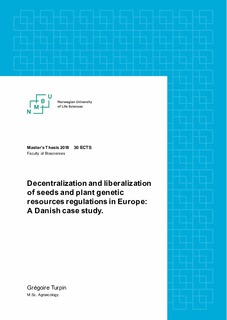| dc.contributor.advisor | Francis, Charles | |
| dc.contributor.advisor | Breland, Tor Arvid | |
| dc.contributor.advisor | Boelt, Birte | |
| dc.contributor.advisor | Roume, Anthony | |
| dc.contributor.author | Turpin, Grégoire | |
| dc.coverage.spatial | Denmark | nb_NO |
| dc.date.accessioned | 2018-11-23T12:38:54Z | |
| dc.date.available | 2018-11-23T12:38:54Z | |
| dc.date.issued | 2018 | |
| dc.identifier.uri | http://hdl.handle.net/11250/2574597 | |
| dc.description.abstract | In a context of severe plant genetic diversity erosion, the regulatory framework of the European Union is perceived as a limiting factor for practices aiming to conserve cultivated biodiversity. To create more supportive frameworks, some EU member states liberalized seed trade and landraces cultivation at national or regional level. For this paper, a case study of the 2015 cereal and vegetable seed legislation reform in Denmark has been carried out. Interviews with stakeholders of the seed system, with farmers and project leaders impacted by this change and with key informant on the regulation, from NGOs and public authorities, have been done to collect. Inductive and deductive analysis methods enabled the themes and opinions of the interviewee to be extracted. Dialogue and lobby at decentralized scale appeared to have helped the implementation of the reform, thanks to the inclusion of the narrative for cultivated biodiversity conservation in the decision system. The reform created supportive framework for seed exchange between farmers and between gardeners, for the commercial and the non-commercial use of landraces and framed innovative seed system model, based on other trust building strategies. The new regulatory framework mainly decriminalized already implementing practices, but the lack of public support to the framed practices are hindering the creation of more positive effects. Nevertheless, Denmark has now one of the most tolerant legislation for seed trade and landrace cultivation, creating many ‘sidetrack’ next to the ‘highway’ of the formal seed system and proves that decentralization and liberalization of seeds regulations is possible | nb_NO |
| dc.language.iso | eng | nb_NO |
| dc.publisher | Norwegian University of Life Sciences, Ås | nb_NO |
| dc.rights | Attribution-NonCommercial-NoDerivatives 4.0 Internasjonal | * |
| dc.rights.uri | http://creativecommons.org/licenses/by-nc-nd/4.0/deed.no | * |
| dc.subject | Agroecology | nb_NO |
| dc.subject | Legislation | nb_NO |
| dc.subject | Biodiversity | nb_NO |
| dc.subject | Nature conservation | nb_NO |
| dc.title | Decentralization and liberalization of seeds and plant genetic resources regulations in Europe : a Danish case study | nb_NO |
| dc.type | Master thesis | nb_NO |
| dc.subject.nsi | VDP::Agriculture and fishery disciplines: 900::Agriculture disciplines: 910::Management of natural resources: 914 | nb_NO |
| dc.source.pagenumber | 74 | nb_NO |
| dc.description.localcode | M-AE | nb_NO |

